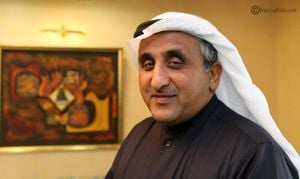The German parliamentary elections held on February 23, 2025, marked a pivotal moment for the country, as the Christian Democratic Union (CDU/CSU), led by Friedrich Merz, looks set to ascend to power after significant electoral gains. With exit polls indicating support of approximately 29%, this victory signals the end of Olaf Scholz's tenure as Chancellor and raises important questions about the future direction of Germany's domestic and foreign policies.
Friedrich Merz, 69, who is expected to be elected as Chancellor, has had quite the political comeback. After years away from frontline politics, Merz returned to the Bundestag as part of the CDU/CSU’s strategy to rejuvenate its image and regain the confidence of the electorate. The CDU/CSU’s substantial victory came as the Social Democratic Party (SPD), led by Olaf Scholz, experienced its worst performance ever, receiving between 16% and 16.5% of the votes.
Scholz, sharing his reflections on the electoral defeat, acknowledged the disappointing results for the SPD, stating, "We lost this election, and we have nothing to discuss this evening." He confirmed he would not pursue any other governmental roles, signaling the party's readiness for significant changes.
Meanwhile, Merz wasted no time acknowledging his victory and emphasized the urgency to commence coalition negotiations as quickly as possible, aiming to form a new government by Easter. Speaking confidently, he remarked, "I know the scale of the task – I understand it will not be easy." Despite the CDU’s willingness to unite with various parties, Merz categorically ruled out any coalition with the far-right Alternative for Germany (AfD).
Following the elections, AfD's leader, Alice Weidel, expressed her party's openness to negotiations with the CDU, asserting they would accept reasonable proposals. Her comments echoed her party's ambitions of overtaking the CDU/CSU within the coming years, reflecting the shifting dynamics of Germany's political spectrum.
Adding to the coalition talks, Christian Lindner from the Free Democratic Party (FDP) hinted at his potential resignation from politics if the FDP failed to surpass the 5% threshold necessary to enter the Bundestag. Current projections place the FDP's support around 4.6%, raising serious concerns about its future.
The elections saw the Greens and the Left party also securing their places, with the Greens regaining ground with approximately 12% to 13.5% of the votes.
Friedrich Merz's candidacy has been characterized by his outspoken support for increasing military aid to Ukraine, urging for the provision of Taurus missiles, which had been previously blocked under Scholz’s government. On December 9, 2024, during his visit to Kyiv, Merz stated, "We want to provide your armed forces with the means to reach military targets, not just civilians... We must allow you to fight with both hands free," signifying his commitment to strengthening Ukraine amid its fight against Russian aggression.
Merz, who launched his political career much earlier but faced significant setbacks, including losing leadership contests against Angela Merkel, has positioned himself as someone who will restore the CDU's conservative roots and provide what many voters perceive as stronger leadership compared to his predecessors. While Merkel's legacy has faced scrutiny, particularly concerning the migration crisis and energy policies, Merz aims to shift the party back to the center-right.
With Germany's economy currently troubled and struggling to adapt to new global challenges, including reliance on Russian gas and notions of social tourism among migrants, Merz’s economic policies promise to reduce taxes and deregulate the economy. His supporters hope to see the return of the so-called “German machine,” which has historically characterized the country’s efficient economy.
Despite Merz’s controversial remarks about immigrants, which have caused waves of criticism, including references to "social tourism" for Ukrainians, he has since apologized for some of his sharper statements. Nevertheless, these comments seem to resonate with voters seeking tougher stances on immigration amid rising populist sentiments across Europe.
Merz's approach to foreign policy, particularly his position on NATO and Russian aggression, is increasingly relevant. He has been vocal against projects like the Nord Stream 2 pipeline and advocated for increased German military readiness. His remarks about needing 2% of GDP for defense reflect growing concerns over security threats and suggest he is markedly more proactive than his predecessor.
Looking forward, the question remains: what kind of coalition will Merz form? He has ruled out alliances with the AfD, which poses considerable challenges for achieving stable legislative majorities. The upcoming negotiations will be significant, as the new government will need to navigate pressing issues domestically—like immigration and the economy—while also responding to the geopolitical dynamics surrounding the Ukraine conflict.
With results still coming to light, reactions from international leaders could shape how Germany’s new government is perceived abroad. Following the elections, leaders including US President Donald Trump and Israeli Prime Minister Benjamin Netanyahu extended congratulations, underscoring the international ramifications of the elections and the expectations of tighter cooperation under Merz’s leadership.
Friedrich Merz’s governance is anticipated to see shifts back toward conservative principles with pronounced changes domestically and internationally. The coming months will reveal not only Merz's leadership style but also the practical outcomes of his policy intentions as Germany embarks on this new political chapter.



